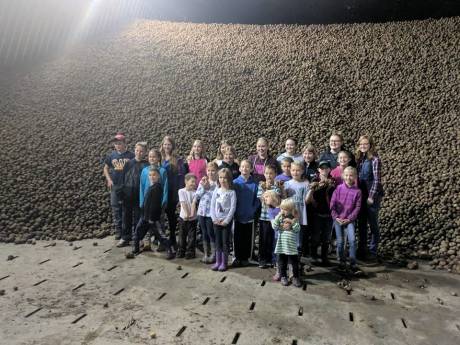Submitted photo and press release:
Fresh market conventional and organic growers of all levels of expertise are invited to tour research plots and ask questions of Cornell Cooperative Extension experts on early pest management options at the third annual Fresh Market Vegetable Field Day on Monday, June 26.
This exciting full-day event will take place at the Cornell Vegetable Program’s Fresh Market Demonstration Site in Batavia. Additionally, industry representatives will be available to meet with growers to answer questions on their products. DEC credits are available for this field day.
The field day runs from 9:30 a.m. to 4 p.m. at the Fresh Market demo site: Partridge's on the Farm Market, 4924 Ellicott Street Road (Route 63), Batavia. Cost is $25 for Cornell Vegetable Program enrollees and $35 for others. Price includes lunch if pre-registered by June 22. The at-the-door price is $35 and includes an information packet, but no guarantee of lunch if you did not pre-register by June 22.
To register online, click here.
For more information contact Darcy Telenko 716-697-4965 or email dep10@cornell.edu
Extension Vegetable Specialists, Darcy Telenko, Judson Reid, Robert Hadad, and Christy Hoepting along with Megan Burley, Extension Educator Cornell Cooperative Extension Erie County, will be leading research site tours and answering questions on the following topics:
- Weed Management Tools for Fresh Market Vegetables
- Fresh Market Vegetable Plot Tour
- Tomato varieties and organic spray programs for disease management
- Cucumber varieties and organic spray programs for downy mildew
- Herbicide options in sweet corn
- Weed management in root crops and zucchini
- GAPS/FSMA Update
- Garlic: Introduction and Tour of the Trials
- Garlic: Q&A about Soil Borne Diseases
- Pest Management in Tomato, Pepper and Eggplant
- New Market Opportunities
Research trials will be on display throughout the day. Darcy Telenko will lead a tour of fresh market vegetable research.
Plots include: demonstration of organic disease management options in tomato and cucumber; sweet corn herbicide trial; pumpkin variety trial for powdery mildew resistance; organic weed management options in both root crops (beets/parsnips) and zucchini. Telenko will discuss how to identify the vegetable diseases in New York, what symptoms we are looking for in the field, and management tools available. The use of disease forecast warning systems (USABlight, Cucurbit Downy Mildew PIPE) will also be discussed. Information will be provided for both conventional and organic growers at all levels of expertise.
Growers will also get to view a sweet corn herbicide trial and observe new herbicide programs in controlling weeds. The major herbicide programs, organic, and mechanical options will be discussed. Topics will also include how to scout after herbicide application to confirm usefulness. Growers will be encouraged to actively participate, and ask questions about the proper use of herbicides in vegetables. Organic weed management options in zucchini and root crops will showcase the peculiarities in regards to weed management the use of a stale-seed bed technique. Growers will be able to view the different weed management tools, look at the economics of utilizing each system, and ask questions.
Robert Hadad will give an update on GAPs (Good Agricultural Practices) and FSMA (Food Safety Modernization Act).
New this year – a large-scale garlic trial on fusarium management. Christy Hoepting and Robert Hadad will review cultural and organic products available for fusarium management in garlic as growers can view research trials. Hoepting and Hadad will lead a discussion of garlic disease questions, offer management options and answer grower questions on best management practices to reduce soilborne diseases and pests of garlic.
Judson Reid will discuss the major diseases in tomato, pepper and eggplant in New York. Topics to be covered include: scouting – where, how and when; identifying the pests; checking for management issues that may improve or decrease disease control; and control options. Information will be provided for both conventional and organic growers at all levels of expertise.
Megan Burley will discuss how to develop new market opportunities for your farm. The new FreshLab in Batavia will talk about their farm to table initiative, with a possible tour of the new facility.
A key component of this event is the support provided by industry organizations. Contributing organizations including Exhibiting Sponsors – BASF, BioSafe Systems, KeyPlex Biopesticides, NutriAg, Oro Agri; and Participating Sponsors – Artic Refrigeration, Empire Tractor, Seedway, Siegers Seed, Stokes Seeds, along with others are recognized as an integral part of this dynamic event. Industry representatives will be on-site with displays and available to talk about some of their new products.
About Cornell Cooperative Extension - Cornell Vegetable Program
The Cornell Vegetable Program is one of the premier regional agricultural Cornell Cooperative Extension programs in New York, serving a large multi-county region in the western and central part of the state. The team's Vegetable Specialists work together with Cornell faculty and extension educators statewide to address the issues that impact the industry. The Cornell Vegetable Program provides educational programs and information to growers, processors and agribusiness professionals, arming them with the knowledge to profitably produce and market safe and healthful vegetable crops, contributing to the viability of farms and the economic wellbeing of New York State. Specifically, our program focuses on food safety, variety evaluation, market development, pest management, and cultural practices.
The Cornell Vegetable Program is supported, in part, by 13 county Cornell Cooperative Extension associations: Allegany, Cattaraugus, Chautauqua, Erie, Genesee, Monroe, Niagara, Ontario, Orleans, Oswego, Seneca, Wayne and Yates counties.




